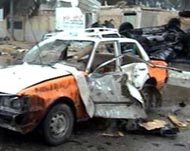New blasts rock Shia city
A bomb has exploded on the western outskirts of Karbala, a day after car bombs there and in the sister shrine city of Najaf killed 66 people.

“A bomb exploded at a spot where the police normally set up checkpoints not far from a hotel,” said police spokesman Rahman Mishawi on Monday.
Aljazeera learned that the target was the al-Sadiya police station.
The blast damaged a number of nearby buildings but no casualties were reported.
On Sunday, a car blast in Karbala killed 13 people and wounded 33 while another car bomb in the central Iraqi city of Najaf killed up to 54 people.
About 50 people have been detained in connection with the Najaf bombing.
“Fifty people, some of them from Najaf and others from outside, have been detained. One person detained this morning is a citizen of an Arab country. They are all being interrogated,” governor Adnan al-Zurufi said on Monday after taking part in a funeral procession attended by thousands of residents.
Security measures
He added that provincial authorities would block off the central quarter, which houses the Imam Ali shrine, to prevent any more car bombings.
 |
|
Cars were used in both the Najaf |
Cars have also been banned from entering the downtown area.
Hospital officials said the toll from Sunday’s blast had risen to 54 and that 142 people were wounded.
Shia political leaders warned that the attacks in Najaf aimed to scare people away from voting.
“They want to make a civil war. These are Shia cities, but the attackers will not have an effect on elections,” said Ammar Dakhl al-Assaidi, a spokesman for the Shia Dawa party.
“There will be more car bombs, suicide bombs, assassinations. There will be more bloodshed. It will increase in Shia areas and mixed areas, where Shia, Sunnis, and Christians live together.”
Al-Qaida blamed
He blamed the bombings on al-Qaida, its suspected leader in Iraq, Abu Musab al-Zarqawi, and members of ousted president Saddam Hussein’s government.
A spokesman for another Shia political party, the Supreme Council for the Islamic Revolution in Iraq (SCIRI), warned that the attacks meant to intimidate Iraqis from taking part in the country’s electoral process.
“They are trying to deter people from participating in the elections. They have miscalculated,” said SCIRI spokesman Haitham al-Husaini.
Al-Sistani
The attacks in Najaf and Karbala came just days after the official launch of the campaign for the 30 January vote.
Shia leader Grand Ayat Allah Ali al-Sistani declared that voting in the elections was a religious duty for all Shia Muslims.
Asked if Sunday’s attack had targeted al-Sistani, who lives several hundred metres from the site of the blast, al-Zurufi said: “We have had information for a long time that his eminence Ayat Allah al-Sistani is a possible target but we are taking all measures to protect him.”